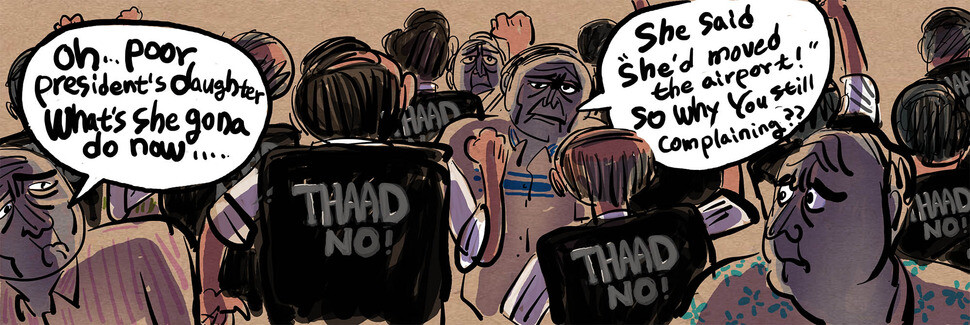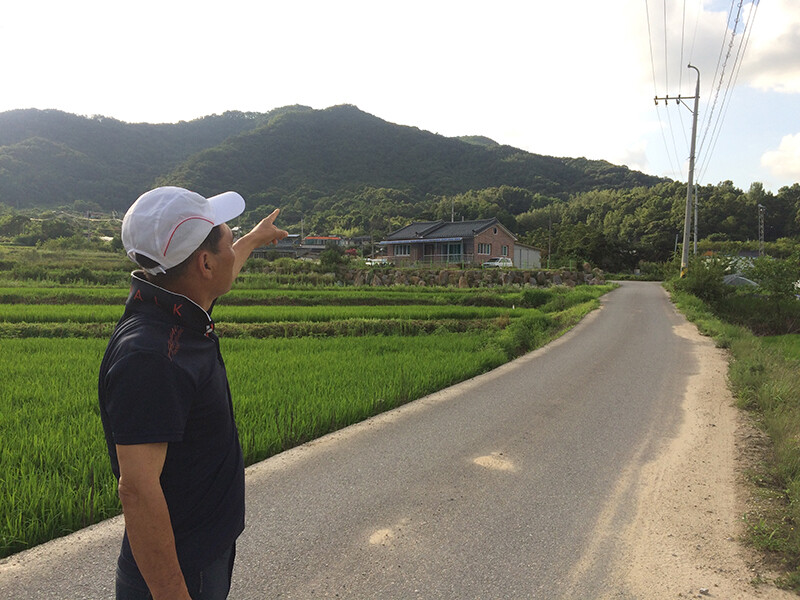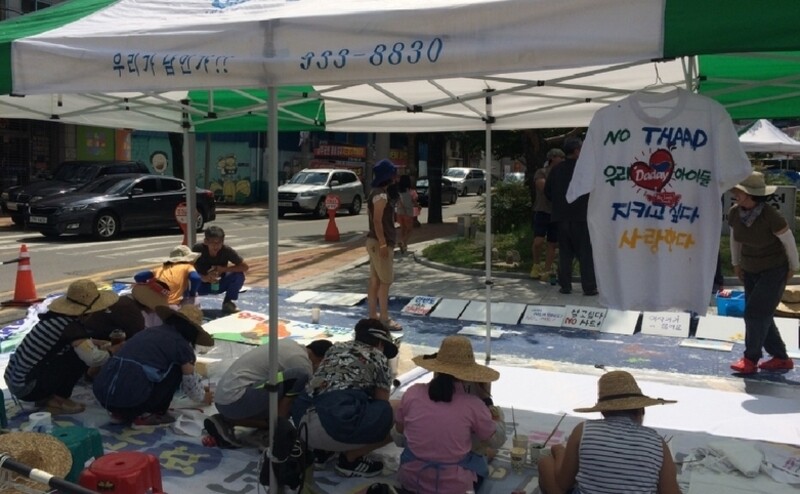hankyoreh
Links to other country sites 다른 나라 사이트 링크
[Reportage part I] In THAAD deployment area, the love for Park Geun-hye is gone

Two days before announcing the THAAD deployment, President Park brought Daegu residents the good news that the Daegu military airport would be relocated. But what is good news for Daegu is bound to be bad news for whatever other place will have to host the military airport instead. The small county of Gunwi in North Gyeongsang Province - which is already being discussed as a possible site for the airport - is in an uproar.
On July 17 and 18, Hankyoreh reporters visited the Daegu and North Gyeongsang area, traditionally conservative strongholds, to take the pulse of local feelings about Park’s shifting policies.
“We adore Park Geun-hye, but I want to cut off the finger I voted for her with.”
“We hear it all,” said Lee Chung-hwan, 54, leader of Chwigok No. 2 Village, in Seongju County, North Gyeongsang Province, on July 17, as he pointed to the Seongsan Antiaircraft Battery, where THAAD is to be deployed. “We hear them shouting ‘one, two, three’ during their morning gymnastics, and we hear them telling such-and-such a corporal to report to the office.”
Seongsan Hawk Missile Battery is on top of Seongsan Hill, at an elevation of 383 meters. The battery is about 100 meters up from the village. In the past, the people of the village would climb up to the battery three or more times a day to chop wood, Lee said.
The air defense base was built around 40 years ago, and the locals have grown up with the sound of the bugle early in the morning and the sound of the radar dish turning. If THAAD is deployed there will clearly be noise of a different magnitude from the various sounds to which villagers have grown accustomed.
The fact that THAAD is being deployed right in front of the village of all places is the first reason that the people of Seongju are angry. Elderly residents at the community center were unable to suppress their frustration. “Seongju adores Park Geun-hye, [but now] I want to cut off the finger I voted for her with. I mean it!” said one. “Gimhae stole the new international airport, and now what’s this about THAAD?” another said.
Whether rich or poor, everyone in Seongju depends on the melon business, and every day the county is abuzz with talk of the THAAD deployment. In the streets of Seongju Township and in the surrounding villages, placards are hung up that say, “There’s no such thing as an ideal place to deploy THAAD,” “Absolutely opposed to THAAD deployment in Seongju County,” and “We can’t hand down electromagnetic waves to our young people.” Stickers expressing opposition to THAAD were also hung up on the shops downtown.
Day in and day out, the central government is promoting THAAD’s safety, but residents are finding it hard to rest easy. Since Seongsan Hill, the proposed location of the battery, is south of Seongju Township, the townspeople would have to live looking every day at THAAD.
While the government claims that Seongju Township is safe because it is 1.5 km away from the battery and because the electromagnetic waves from the radar will be emitted at a five-degree incline from the top of the hill, townspeople don‘t believe what the government is saying.
“During a gathering, I watched a video about the stories of people who live near the X-band radar installations in Japan,” said Lee Jae-dong, president of the farmers’ association in Seongju County. “Some of the Japanese there say that the noise is driving them crazy. I think the government is lying to us. I believe what it says in the US army manual, not the lies that the Defense Ministry is telling us.”
The US army manual states that the “no hazard” safe area for the THAAD radar is 3.6 km, but South Korean Defense Minister Han Min-koo told the National Assembly that “you don’t need to worry about electromagnetic waves at a distance of 100 meters.”

A girl to her grandfather in Seongju: “I can’t visit you anymore”
What makes Seongju residents even angrier about the government’s decision to deploy THAAD is its unilateral administrative approach. Even granting that the policy has to do with national defense, residents are baffled about how the government could decide to deploy the THAAD battery on the hill behind the town without any prior negotiations.
“You have to get a permit to build a house, don’t you? What gives them the right to build something this big without so much as a by-your-leave?” said a 69-year-old individual surnamed Bae, who spoke to the Hankyoreh at the community center in Seongwon No. 2 Village, Seonnam Township.
Residents are horrified at the very thought that the Seongju brand could switch from melons to THAAD.
“The day they announced THAAD, my six-year-old granddaughter in Gumi called me to say she wouldn‘t feel safe visiting my house anymore,” said Son Ho-taek, leader of Seongwon No. 2 Village. “As a grandparent, that’s just heartbreaking. My wife and I wept for a long time.”
During the 2012 presidential election, President Park received 86% of the vote in Seongju. This was the fourth highest percentage of the 23 cities and counties of North Gyeongsang Province. Locals strongly feel that Park has betrayed them - rather like a jilted lover. People in the village referred to her in harsh terms, talking about how they “wanted to cut off the finger they voted with.”
“Her father [former President Park Chung-hee] made life worth living by getting rid of the ‘barley hump’ and giving people enough to eat, but Park Geun-hye is trying to kill people,” Son said. The “barley hump” was the challenging time before the barley crop in the summer when people often ran low on food.
“When the Sewol tragedy occurred, I didn’t understand why so many people blamed President Park when she hadn’t done anything, but now I see I was wrong. Now I understand why Park was blamed,” Bae said.
“We’re not voting for the Saenuri Party anymore. We supported them because of the Park family, and no doubt they’ve done some things well and some things poorly, but this is one thing people say they can’t get over. They may not vote, and even if they do they won’t be voting for the Saenuri Party,” said a 78-year-old surnamed Lee.

Relieved to dodge THAAD bullet, Chilgok is accused of NIMBY response
These feelings were shared by the residents of Seongwon No. 1 Village, who got their fifteen minutes of fame for tearing down a picture of Park that was hanging on the wall of the community center.
The village is the home of a large number of members of the Goryeong branch of the Park clan, and the villagers hold the family of Park Chung-hee in unusual regard. They would even visit Seoul each year on Aug. 15 for the memorial service for Park Chung-hee’s wife Yuk Young-soo and on Oct. 26 for the memorial service for Park Chung-hee.
Villagers’ nerves are now on edge because of an article trending on social media claiming that they were in favor of THAAD. “Park Geun-hye’s photograph was so precious to me that I would dust it every morning and night, but now I’m just so disheartened. Once the love is gone, it doesn’t come back easily,” said one resident.
The Daegu and North Gyeongsang areas have supported a hardline stance on North Korea and have been in favor of THAAD deployment. In fact, it was their rock-solid support that enabled Park to push through the decision to deploy THAAD.
But as the deployment became a reality, the people in these places have switched to a more ambiguous stance. What they are saying now is that THAAD should still be deployed, but not in the area we live in. This has led to accusations that residents are guilty of a “not in my backyard”, or NIMBY, reaction.
After Seongju was chosen as the site of the THAAD radar, there was a clear distinction between areas that were relieved and areas that were enraged. The vocal opposition to THAAD in Seongju, a county with a population of 45,000, does not appear to be spreading to the whole of North Gyeongsang Province.
Even in Chilgok County, which is next to Seongju, the response has been distinctly different.
“THAAD is being deployed for the Korean people, so it doesn’t matter where they put it. When our mayor shaved his head in opposition to THAAD, he must have been out of his mind,” said a 70-year-old surnamed Lee whom I met at Waegwan Market in Chilgok on July 18.
A 57-year-old surnamed Yoon agreed with this. “They have to bring in THAAD, and it doesn’t matter where, as long as it’s somewhere up high. Since the battery is being deployed up on a hill, Seongju isn’t at issue. Chilgok isn’t suitable because the [USFK Camp Carroll] base is on level ground,” Yoon said.
Kim An-soo, chair of the Committee to Block THAAD, rejects media criticism that Seongju’s opposition to THAAD constitutes a NIMBY reaction. “The people who are inwardly happy that THAAD isn’t coming to their area are tacitly guilty of NIMBY, too,” Kim said.
When Chilgok was mentioned as a leading candidate for the THAAD deployment site before Seongju was chosen, the mayor of Chilgok County shaved his head in protest. On the morning of July 13, just before Seongju was announced, National Assembly lawmakers representing Daegu and North Gyeongsang Province held a press conference in which they expressed their opposition and said that THAAD must be deployed somewhere that South Koreans as a whole can accept as being the best location for defending the Korean Peninsula. But on July 18, these lawmakers had changed their tune and denied media reports that they were opposed to THAAD being deployed in the Gyeongsang region.
By Lee Kyung-mi and Um Ji-won, staff reporters
Please direct questions or comments to [english@hani.co.kr]

Editorial・opinion
![[Column] Has Korea, too, crossed the Rubicon on China? [Column] Has Korea, too, crossed the Rubicon on China?](https://flexible.img.hani.co.kr/flexible/normal/500/300/imgdb/original/2024/0419/9317135153409185.jpg) [Column] Has Korea, too, crossed the Rubicon on China?
[Column] Has Korea, too, crossed the Rubicon on China?![[Correspondent’s column] In Japan’s alliance with US, echoes of its past alliances with UK [Correspondent’s column] In Japan’s alliance with US, echoes of its past alliances with UK](https://flexible.img.hani.co.kr/flexible/normal/500/300/imgdb/original/2024/0419/2317135166563519.jpg) [Correspondent’s column] In Japan’s alliance with US, echoes of its past alliances with UK
[Correspondent’s column] In Japan’s alliance with US, echoes of its past alliances with UK- [Editorial] Does Yoon think the Korean public is wrong?
- [Editorial] As it bolsters its alliance with US, Japan must be accountable for past
- [Guest essay] Amending the Constitution is Yoon’s key to leaving office in public’s good graces
- [Editorial] 10 years on, lessons of Sewol tragedy must never be forgotten
- [Column] A death blow to Korea’s prosecutor politics
- [Correspondent’s column] The US and the end of Japanese pacifism
- [Guest essay] How Korea turned its trainee doctors into monsters
- [Guest essay] As someone who helped forge Seoul-Moscow ties, their status today troubles me
Most viewed articles
- 1[Column] The clock is ticking for Korea’s first lady
- 2Samsung barricades office as unionized workers strike for better conditions
- 3After 2 months of delayed, denied medical care, Koreans worry worst may be yet to come
- 4[Correspondent’s column] In Japan’s alliance with US, echoes of its past alliances with UK
- 5[Column] Has Korea, too, crossed the Rubicon on China?
- 6Hong Se-hwa, voice for tolerance whose memoir of exile touched a chord, dies at 76
- 7[Photo] Smile ambassador, you’re on camera
- 8All eyes on Xiaomi after it pulls off EV that Apple couldn’t
- 9[Guest essay] How Korea turned its trainee doctors into monsters
- 10US overtakes China as Korea’s top export market, prompting trade sanction jitters